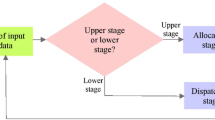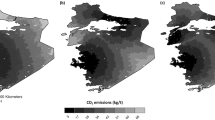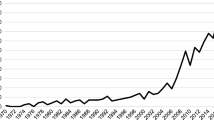Abstract
This paper addresses resource-constrained project scheduling problem with mixed uncertainty of randomness and fuzziness (FS-RCPSP). The activity durations are considered to be fuzzy random variables. A resource flow network based mathematical model with fuzzy random variables is presented. Then, this model is transformed into a mixed-integer linear programming model with crisp variables. The CPLEX 12.6.0.1 solver in AIMMS (2014) is employed for applying the proposed model to solve 960 benchmark instances generated from the well-known sets J30 and J60 in PSPLIB. The computational results are encouraging and indicate the ability of the proposed model to handle the FS-RCPSP.


Similar content being viewed by others
References
Artigues C, Michelon P, Reusser S (2003) Insertion techniques for static and dynamic resource-constrained project scheduling. Eur J Oper Res 149:249–267
Artigues C, Leus R, Nobibon FT (2013) Robust optimization for resource-constrained project scheduling with uncertain activity durations. Flex Serv Manuf J 25(1):175–205
Ashtiani B, Leus R, Aryanezhad MB (2011) New competitive results for the stochastic resource-constrained project scheduling problem: exploring the benefits of pre-processing. J Sched 4(2):157–171
Atli O, Kahraman C (2012) Fuzzy resource-constrained project scheduling using taboo search algorithm. Int J Intell Syst 27:873–907
Atli O, Kahraman C (2013) The MinSlack and Kangaroo algorithm heuristic for fuzzy resource-constrained project scheduling problems. J Mult Valued Logic Soft Comput 20:189–219
Ballestin F, Leus R (2009) Resource-constrained project scheduling for timely project completion with stochastic activity durations. Prod Oper Manag 18(4):459–474
Bhaskar T, Pal MN, Pal AK (2011) A heuristic method for RCPSP with fuzzy activity times. Eur J Oper Res 208:57–66
Buckley JJ (2005) Fuzzy probability: new approach and applications. Studies in fuzziness and soft computing series. Springer, Berlin
Buckley JJ, Feuring T (2000) Evolutionary algorithm solution to fuzzy problems: fuzzy linear programming. Fuzzy Sets Syst 109:35–53
Damay J, Quilliot A, Sanlaville E (2007) Linear programming based algorithms for preemptive and non-preemptive RCPSP. Eur J Oper Res 182:1012–1022
Ebadian M, Sowlati T, Sokhansanj S, Townley-Smith L, Stumborg M (2013) Modeling and analysing storage systems in agricultural biomass supply chain for cellulosic ethanol production. Appl Energy 102:840–849
Fang C, Kolisch R, Wang L, Chundi M (2015) An estimation of distribution algorithm and new computational results for stochastic resource-constrained project scheduling problem. Flex Serv Manuf J 1:1–21
Hapke M, Jaskievicz A, Slowinski R (1994) Fuzzy project scheduling system for software development. Fuzzy Sets Syst 21:101–117
Herroelen W, Leus R (2004a) Robust and reactive project scheduling: a review and classification of procedures. Int J Prod Res 42(8):1599–1620
Herroelen W, Leus R (2004b) The construction of stable project baseline schedules. Eur J Oper Res 156:550–565
Herroelen W, Leus R (2005) Project scheduling under uncertainty: survey and research potentials. Eur J Oper Res 165:289–306
Hirota K (1981) Concepts of probabilistic sets. Fuzzy event. J Math Anal Appl 23:421–427
Huang W, Ding L, Wen B, Cao B (2009) Project scheduling problem for software development with random fuzzy activity duration times. Springer, Berlin
Itoh T, Ishii H (2005) One machine scheduling problem with fuzzy random due-dates. Fuzzy Optim Decis Mak 4:71–78
Ke H, Liu B (2007) Project scheduling problem with mixed uncertainty of randomness and fuzziness. Eur J Oper Res 183:135–147
Klir GJ, Yuan B (2000) Fuzzy sets and fuzzy logic, 3rd edn. Prentice Hall of India Ltd
Kolisch R, Hartmann S (2006) Experimental investigation of heuristics for resource-constrained project scheduling: an update. Eur J Oper Res 174:23–37
Kruse R, Meyer KD (1987) Statistics with vague data. D. Reidel Publishing Company, Dordrecht
Lambrechts O, Demeulemeester E, Herroelen W (2008) Proactive and reactive strategies for resource-constrained project scheduling with uncertain resource availabilities. J Sched 11:121–136
Leu SS, Chen AT, Yang CH (1999) Fuzzy optimal model for resource-constrained construction scheduling. J Comput Civ Eng 13(3):207–216
Leus R, Herroelen W (2004) Stability and resource allocation in project planning. IIE Trans 36:667–682
Liu B (2002a) Theory and practice of uncertainty programming. Physica, Heidelberg
Liu B (2002b) Random fuzzy dependent-chance programming and its hybrid intelligent algorithm. Inf Sci 141:259–271
Lorterapong P (1994) A fuzzy heuristic method for resource-constrained project scheduling. Proj Manag J 25:12–18
Luhandjula MK (2006) Fuzzy stochastic linear programming: survey and future research directions. Eur J Oper Res 174:1353–1367
Marler RT, Arora JS (2010) The weighted sum method for multi-objective optimization: some insights. Struct Multidiscip Optim 41(6):853–862
Mostafaei H, Alipouri Y, Zadahmad M (2015) A mathematical model for scheduling of real-world tree-structured multi-product pipeline system. Math Methods Oper Res 81:53–81
Nematian J, Eshghi K, Eshragh-Jahromi A (2010) A resource-constrained project scheduling problem with fuzzy random duration. J Uncertain Syst 4(2):123–132
Pantouvakis J, Manoliadis OG (2006) A practical approach to resource-constrained project scheduling. Oper Res Int J 6(3):299–309
Paraskevopoulos DC, Tarantilis CD, Ioannou G (2012) Solving project scheduling problems with resource constraints via an event list-based evolutionary algorithm. Exp Syst Appl 39:3983–3994
Pham DT, Castellani M (2002) Action aggregation and defuzzification in Mamdani-type fuzzy systems. Proc Inst Mech Eng Part C J Mech Eng Sci 216(7):747–759
Puri ML, Ralescu DA (1986) Fuzzy random variables. J Math Anal Appl 114:409–422
Sadeh N, Otsuka S, Schelback R (1993) Predictive and reactive scheduling with the microboss production scheduling and control system. In: Proceedings of the IJCAI-93. workshop on knowledge-based production planning, scheduling and control, pp 293–306
Sebt MH, Alipouri Y, Alipouri Y (2013) Solving resource-constrained project scheduling problem with evolutionary programming. J Oper Res Soc 64:1327–1335
Smith SS (1994) Reactive scheduling systems. In: Brown DE, Scherer WT (eds) Intelligent scheduling systems. Kluwer, Dordrecht
Tormos P, Lova A (2001) A competitive heuristic solution technique for resource-constrained project scheduling. Ann Oper Res 102:65–81
Van de Vonder S, Demeulemeester E, Herroelen W (2007) A classification of predictive-reactive project scheduling procedures. J Sched 10:195–207
Van der Veen E, Hans EW, Veltman B, Berrevoets LM, Berden HJJM (2015) A case study of cost-efficient staffing under annualized hours. Health Care Manag Sci 18(3):279–288
Wang J (2004) A fuzzy robust scheduling approach for product development projects. Eur J Oper Res 152:180–194
Xianggang W, Wei H (2010) Fuzzy resource-constrained project scheduling problem for software development. Wuhan Univ J Nat Sci 15(1):25–30
Xu J, Zhang Z (2012) A fuzzy random resource-constrained scheduling model with multiple projects and its application to a working procedure in a large-scale water conservancy and hydropower construction project. J Sched 15:253–272
Yager RR (1986) A characterization of the extension principle. Fuzzy Sets Syst 18(3):205–217
Ying KC, Lin SW, Lee ZJ (2009) Hybrid-directional planning: improving improvement heuristics for scheduling resource-constrained projects. Int J Adv Manuf Technol 41(3):358–366
Zadeh LA (1968) Probability measures of fuzzy events. J Math Anal Appl 23:421–427
Zadeh LA (1975) “The concept of a linguistic variable and its application to approximate reasoning-Part I. Inf Sci 8(3):199–249
Zaghian A, Mostafaei H (2015) An MILP model for scheduling the operation of a refined petroleum products distribution system. Int J Oper Res 1:1–30
Zamani R (2011) A hybrid decomposition procedure for scheduling projects under multiple resource constraints. Oper Res Int J 11:93–111
Author information
Authors and Affiliations
Corresponding author
Appendix: Nomenclatures
Appendix: Nomenclatures
The different index/sets, parameters, and variables in this paper are defined as follows:
See Table 3.
Rights and permissions
About this article
Cite this article
Alipouri, Y., Sebt, M.H., Ardeshir, A. et al. A mixed-integer linear programming model for solving fuzzy stochastic resource constrained project scheduling problem. Oper Res Int J 20, 197–217 (2020). https://doi.org/10.1007/s12351-017-0321-x
Received:
Revised:
Accepted:
Published:
Issue Date:
DOI: https://doi.org/10.1007/s12351-017-0321-x




